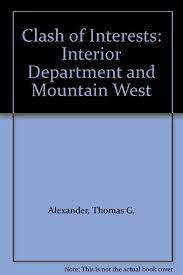Articles/Essays – Volume 11, No. 2
A Clash of Interests | Thomas G. Alexander, A Clash of Interests: Interior Department and the Mountain West, 1863–96
This excellent, provocative study breaks new ground in probing the history of the Intermountain West. It had its inception when Professor Alexander noticed the widespread dissatisfaction of the residents of the far western Territories with the Federal government. Why, he asked, did they grumble when that government clearly spent more money in the Territories than it took from them? Expanding his investigation, he had to answer still other questions: For what functions did Congress appropriate funds, and why? For what activities did Westerners want Federal funds appropriated? How well were policies planned and how well were they implemented?
For his study the author chose Utah, Idaho and Arizona Territories. They were geographically similar and their histories fitted into a relatively similar chronology. Arizona and Idaho Territories were created in 1863; Idaho achieved statehood in 1890 and Utah in 1896. Moreover, Idaho and Arizona would balance any tendency away from the norm due to Utah’s Mormon population and its conflicts with the Federal government.
In three parts, cut into nine chapters, Alexander analyzes these relations. Particular attention is paid to land policy as carried out under the General Land Office and Indian matters under the Bureau of Indian Affairs. He rightly identifies the Washington policy makers and probes their rationales. The Secretaries of Interior are given ample attention, but Alexander finds that for much of the period the real source of power was the Appropriations Committee of the House of Representatives. There the opponent of Western needs was ultraconservative, narrow-minded William S. Holman of Indiana.
Conclusions from this penetrating study are enlightening. Canards about the corruption of Indian agents, accusations about frauds in land acquisition, and widely believed premises about western attitudes toward land and Indians are exposed as totally inaccurate or, at the most, half-truths.
For almost the first time a competent western historian has written a book that defends Westerners from these widely disseminated accusations. The blame for so much wrong is placed squarely in the lap of Congress and the Eastern establishment. John Wesley Powell, that patron saint of western bureaucrats and certain well-known writers about the American West, is also exposed for his arrogant Big Brotherism. Finally, the reasons for the troubles are described: thoughtless parsimony, pupilage, the ideological construct of men in power who possessed a Midwestern view of how things should be done in the arid West where water, not land, was the key to development; cultural imperialism that harassed the Mormons and tried to make sodbusters of Indians.
In our own age of excessive government expenditures, it is hard to believe the stinginess of the Congress of the 1870’s and 1880’s. Yet parsimony was rampant, and Alexander makes it clear that economy took precedence over effectiveness. He finds one Territorial governor who had to remove his telephone for lack of funds, contractors who raised their bids by 20% because payment was so slow in coming, and starving Indians breaking out of one reservation while Indians at another reservation had too much food.
Sometimes the problems involved poor communications. Federal funds often were dispersed from New York or San Francisco, and beef contracts for Indians were opened in New York City. Given the communications of those years, a breakdown was inevitable.
Alexander is a thoughtful, provocative, competent historian. He is full of suggestions and new ideas. Who else ever has thought of comparing the 100th meridian demarcation line with the Proclamation Line of 1763? His essay on the Industrial Christian Home Association, funded by Congress for female refugees from polygamy, is fascinating reading. His linkage of the Dawes Severalty Act with the Edmunds-Tucker Act creates a new, wider view of American bigotry and anti-pluralism in the two decades before 1900.
Let us hope that Dr. Alexander will continue his research and in the process will prepare the long overdue defense of the much maligned citizens of the arid West in the late 19th century.
A Clash of Interests: Interior Department and the Mountain West 1863–96 by Thomas G. Alexander. Provo, Utah: Brigham Young University Press, 1977, xii, 256 pp., appendix, bibliography, index. $11.95


 Back to full Issue
Back to full Issue

